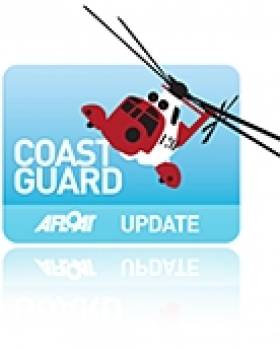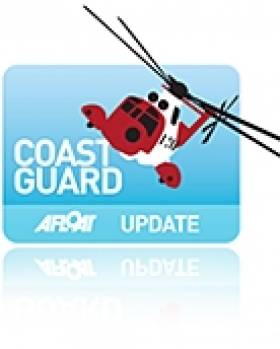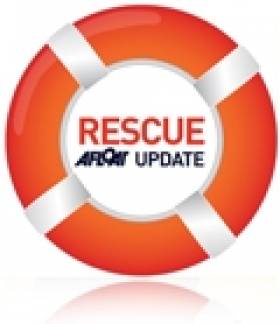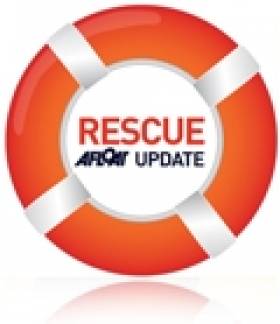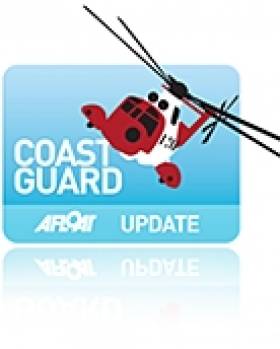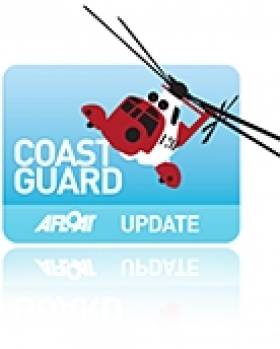Displaying items by tag: Search and Rescue
Howth Coast Guard Operates New Side Scan Sonar
#COASTGUARD - Howth Coast Guard will be one of the first search and rescue teams to avail of the Irish Coast Guard's new side scan sonar, it has emerged.
The specialised underwater sonar is available for 24/7 response on rivers, lakes, harbours and at sea.
The device is towed under the water and feeds a live scan of the area below it to a laptop operator on the surface.
The system can detect objects of all sizes and can be used to assist with the search of a missing person, for example, to quickly identify or rule out possible search areas before sending in Garda dive teams.
Howth Coast Guard says its menders have been trained up in the operations of the sonar over the last few months, and will be available to respond by request through the National Maritime Operations Centre (NMOC).
Search for Missing UK Yachtswoman Continues
A 65-year-old woman who left Cornwall, in a yacht purchased the day before has sparked a search and resuce operation after she failed to arrive home in Devon.
The £32,000 Seagair sloop was purchased in Falmouth last Thursday.
Relatives in Bideford raised the alarm on Sunday after she failed to appear.
According to a BBC report today, an air and sea search has been launched off the Cornish coast for a 65 year-old yachtswoman, who has not been seen since she set sail from Mousehole, Cornwall on Saturday. She was heading for her home town of Bideford, North Devon.
Surface Search for Missing Diver Winds Down
#MISSING DIVER - Teams were still searching yesterday at a wreck site off Cape Clear for a diver missing since Tuesday, according to The Irish Times.
A Defence Forces spokesperson told the paper that a sonar device would be employed to scan the seabed for any sign of 54-year-old Reinhardt Teschke, who failed to resurface from a 90m dive on the wreck of British merchant vessel the Minnehaha.
As previously reported on Afloat.ie, Baltimore RNLI launched both its inshore and all-weather lifeboats to the scene south of Balitmore Harbour in West Cork on Tuesday evening to search for the German diver, one of a party of three at the wreck site.
Irish Coast Guard helicopter Rescue 115 and the Naval Service vessel LE Ciara were also involved in the surface search, which was set to be wound down yesterday.
Donegal Coastguard's Cliff Rescue Service May Be Scrapped
#COASTGUARD - The Donegal Democrat reports that the northern county may soon lose the cliff rescue service supplied by the Bunbeg coastguard unit.
Irish Coast Guard spokesman Gerard O'Flynn confirmed that the recent Fisher Report commissined by Minister for Transport Leo Varadkar "recommends that the Bunbeg unit should just continue as a coastguard boat and search team and no longer offer the cliff rescue element of their operation."
He added: "There has been no decision taken on this. It is only contained in the report, it is at discussion level."
As previously reported on Afloat.ie, the same 'value for money' report has recommended the closure of both coastguard radio stations at Malin Head and Valentia Island.
The Bunbeg unit, which comprises 23 volunteers in total, covers much of the county's northwestern coastline from Rosbeg to Horn Head which has become a popular spit for climbers both on the mainland and offshore on the likes of Tory Island and Arranmore.
Body Recovered from Lough Derg in Capsized Speedboat Search
#LOUGH DERG - RTÉ News reports that the body of a man in his 40s was recovered from Lough Derg on Friday night.
As previously reported on Afloat.ie, the Lough Derg RNLI lifeboat was launched to investigate an upturned speedboat in Youghal Bay near Garrykennedy on Thursday evening.
The 20ft vessel was said to have extensive damage to the outdrive and propellers, consistent with damage sustained while running.
The Killaloe unit of the Irish Coast Guard immediately launched a search and rescue operation in the area for any mossing persons, assisted by the Shannon coastguard helicopter.
There was no reports on shore of anyone overdue, and as of Friday attempts were ongoing to find out who might own the boat and who was on board at the time of the incident.
Divers with the Killaloe Search and Rescue Unit found the body some 30m from the boat and recovered it around 8pm on Friday. A post-mortem was scheduled to be carried out yesterday at Mid-Western Regional Hospital in Limerick.
Body Found in Search for Missing Angler Off Valentia Island
#MISSING FISHERMAN - Search teams combing the coast off Valentia Island for a missing fisherman have this afternoon found the body of a man, according to the Irish Examiner.
A major search operation was launched last night after the 32-year-old angler slipped and fell into the water while fishing with a group of seven at Culloo Rock off the Co Kerry island.
Garda and Naval Service divers this afternoon joined the search, which resumed at 6am headed by the Valentia lifeboat and Kingstown coastguard unit, with assistance from the Waterford-based Irish Coast Guard rescue helicopter.
The body recovered by divers has not yet been identified.
Lifeboat operations manager Richard Foran said the area is notorious for people losing lives, as the Belfast Telegraph reports.
"It's a fantastic fishing, spot but the problem is it is exposed to the Atlantic," he said.
Body Found in Search for Missing Currach Fisherman in Galway
#SEARCH AND RESCUE - A body was recovered yesterday during the search for a 43-year-old fisherman missing off the Galway coast, as RTÉ News reports.
The body was discovered near the shoreline of St Macdara’s island off Carna, some distance from the empty currach found early yesterday morning at Inis Mór in the Aran Islands to the south.
The missing man, named locally as Gerry Folan or Gearoid O'Cualáin, was last seen rowing a currach from the Mace Head area around 5pm on Monday evening.
As previously reported on Afloat.ie, a major air and sea search and rescue operation was launched, assisted by Irish Coast Guard helicopters and the Air Corps Casa patrol craft.
RTÉ News has more on the story HERE.
Major Search Under Way for Missing Fisherman Off Galway Coast
#SEARCH AND RESCUE - The Irish Times reports of a major air and sea search and rescue operation for a 43-year-old fisherman missing off the Galway coast.
Irish Coast Guard helicopters based at Sligo and Shannon joined the overight search for the man, who was last seen rowing a currach from the Mace Head area around 5pm yesterday.
It is understood that a currach was found in the area this morning.
The search resumed at first light, with the Air Corps Casa patrol craft searching the area, and coastguard and lifeboat crews set to rejoin the operation.
Coastguard Helicopter Gets State-Of-The-Art Imaging Systems
#COASTGUARD - Canada's L-3 Wescam has announced it will be providing electro-optical and infrared imaging systems for the Irish Coast Guard's revamped search and rescue helicopter fleet, starting with the new Sikorsky S-92 based at Shannon.
“This order pairs the most modern SAR helicopter with the most advanced EO/IR sensor to provide a vital capability for lifesaving missions,” said Paul Jennison, vice president of government sales and business development for L-3 Wescam.
The company describes its MXTM-15 system as a one-line replacement unit solution, which reduces installation weight by 25% and increases much-needed cabin space for transporting rescue victims.
The system’s digital infrared camera is capable of a 20% increase in visual range, allowing missions at night or in inclement weather to result in a higher search success rate.
In addition, the system comes with WESCAM’s MX-GEO Gen 3 software package which helps deliver maximum geographic location accuracy and significantly reduces operator fatigue that often arises in demanding and stressful SAR operations.
Imaging system upgrades are expected to be rolled out across the Irish Coast Guard's helicopter fleet by the end of next year.
Unified EU Coastguard On The Cards
#COASTGUARD - Greater co-operation between Europe's coastguard organisations is inevitable, according to the Irish Coast Guard director.
Chris Reynolds was speaking at Search and Rescue 2012, the EU Heads of Coastguard conference in Dublin last Thursday, at which he outlined a feasibility study being conducted by the European Commission on a standardised coastguard service across Europe.
As Shephard Media reports, Reynolds admitted that some challenges stood in front of any effective change in the sector, noting that SAR policy at member state level is often spread across many departments.
But the Costa Condordia disaster off the Italian coast recently may focus governments to develop a "sense of urgency" on the issue, he said.
In the keynote address at the conference, Italian coastguard chief Giuseppe Troina said it was fortunate that the death toll in that incident had not been much greater, emphasising that more than 4,000 people survived the cruise ship's sinking.
The Irish Times has more on the story HERE.


























